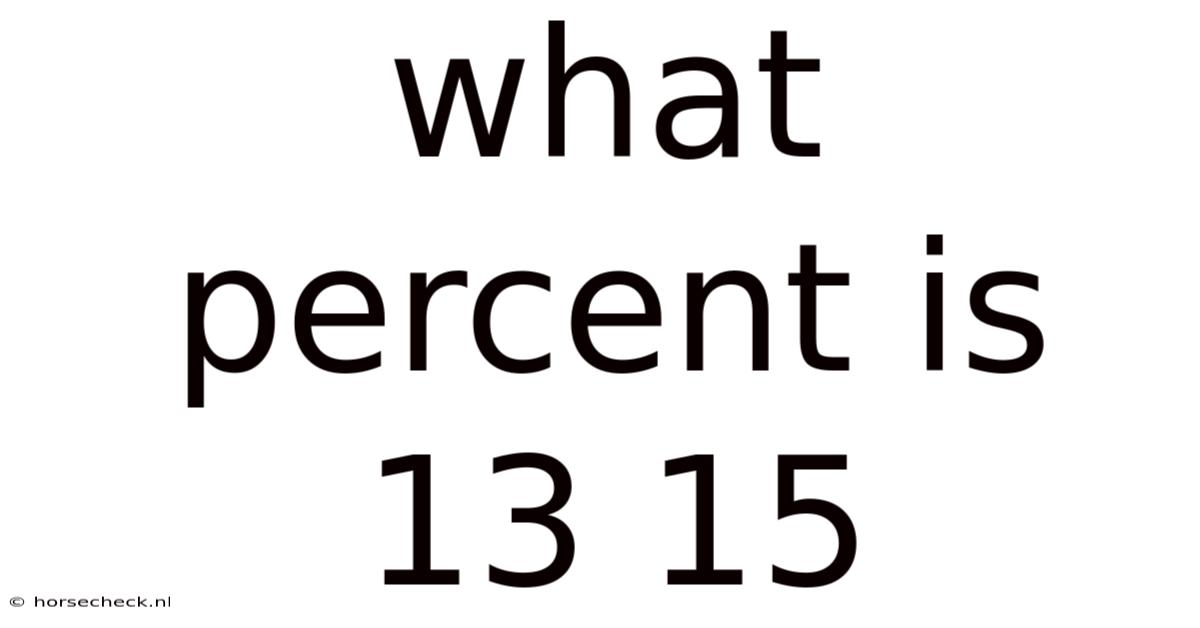What Percent Is 13 15
horsecheck
Sep 23, 2025 · 4 min read

Table of Contents
What Percent is 13 of 15? A Deep Dive into Percentage Calculations
Understanding percentages is a fundamental skill applicable across numerous fields, from everyday finances to advanced scientific calculations. This article will thoroughly explore how to calculate what percent 13 is of 15, providing not just the answer but a comprehensive understanding of the underlying principles and various methods for solving similar percentage problems. We'll cover the basic formula, alternative approaches, and even delve into the practical applications of this type of calculation. By the end, you'll be confident in tackling any percentage problem that comes your way.
Understanding the Basics of Percentages
Before we dive into the specifics of calculating what percent 13 is of 15, let's establish a solid foundation in percentage terminology and concepts. A percentage represents a fraction of 100. The word "percent" literally means "out of 100" (per centum in Latin). Therefore, 50% means 50 out of 100, or 50/100, which simplifies to 1/2.
The key to understanding percentage problems lies in recognizing the relationship between three core components:
- The Part: This is the number representing a portion of the whole (in our case, 13).
- The Whole: This is the total number that the part is a fraction of (in our case, 15).
- The Percentage: This is the value we want to find, representing the part as a fraction of the whole expressed as a percentage (%).
Calculating What Percent 13 is of 15: The Standard Method
The most common method for calculating percentages involves a straightforward formula:
(Part / Whole) x 100% = Percentage
Let's apply this formula to our problem:
(13 / 15) x 100% = Percentage
-
Divide the part by the whole: 13 divided by 15 is approximately 0.8667
-
Multiply by 100%: 0.8667 x 100% = 86.67%
Therefore, 13 is approximately 86.67% of 15.
Alternative Methods for Calculating Percentages
While the standard method is reliable and straightforward, alternative approaches can offer valuable insights and simplify calculations in certain scenarios.
Method 2: Using Proportions
Proportions provide a visual and intuitive way to solve percentage problems. We can set up a proportion like this:
13/15 = x/100
Where 'x' represents the percentage we're trying to find. To solve for 'x', we cross-multiply:
13 x 100 = 15x
1300 = 15x
x = 1300/15 = 86.67
This method confirms our earlier result: 13 is approximately 86.67% of 15.
Method 3: Decimal Conversion
This method involves converting the fraction to a decimal and then multiplying by 100%.
-
Convert the fraction to a decimal: 13/15 ≈ 0.8667
-
Multiply by 100%: 0.8667 x 100% = 86.67%
Understanding the Significance of Decimal Places
Notice that in our calculations, we obtained a result of 86.67%. The use of decimal places is crucial for accuracy. Depending on the context of the problem, you might need to round the percentage to a specific number of decimal places. For instance, if you are dealing with financial calculations, rounding to two decimal places (cents) is typically necessary. In other contexts, rounding to the nearest whole number might suffice. Always consider the level of precision required for your application.
Practical Applications of Percentage Calculations
The ability to calculate percentages is indispensable in various real-world situations. Here are a few examples:
-
Finance: Calculating interest rates, discounts, tax amounts, profit margins, and investment returns all rely heavily on percentage calculations.
-
Science: Percentages are used extensively in scientific research and data analysis, such as expressing the concentration of a solution, calculating statistical significance, or representing proportions in experiments.
-
Business: Businesses utilize percentages for tasks like calculating sales growth, market share, and employee performance metrics.
-
Everyday Life: Percentages help us understand discounts in shops, calculate tips in restaurants, or interpret statistics presented in news reports.
Frequently Asked Questions (FAQ)
Q1: How do I calculate a percentage increase or decrease?
To calculate a percentage increase, subtract the original value from the new value, divide the result by the original value, and multiply by 100%. A percentage decrease is calculated similarly, but you subtract the new value from the original value.
Q2: What if the "whole" number is zero?
You cannot divide by zero. A percentage calculation is undefined when the whole is zero.
Q3: Can I use a calculator for percentage calculations?
Yes, most calculators have a percentage function (%) that simplifies the calculation. Simply input the calculation (Part/Whole) and press the % button.
Q4: How can I improve my understanding of percentages?
Practice is key! Try solving various percentage problems using different methods to solidify your understanding. You can find numerous practice exercises online or in textbooks.
Conclusion: Mastering Percentage Calculations
Calculating what percent 13 is of 15, as we have demonstrated, is a straightforward process once you grasp the underlying principles. This article has presented the standard method along with alternative approaches, emphasizing the importance of accuracy and the practical applications of percentage calculations in diverse fields. By understanding the fundamental concepts and practicing different methods, you'll develop the confidence and skills to tackle any percentage problem effectively and efficiently, enhancing your problem-solving abilities across various domains. Remember, the key is to understand the relationship between the part, the whole, and the percentage, and to choose the method that best suits your needs and the context of the problem.
Latest Posts
Latest Posts
-
16 5 As A Decimal
Sep 23, 2025
-
Convert 88 To A Fraction
Sep 23, 2025
-
Gcf For 12 And 30
Sep 23, 2025
-
Gcf Of 14 And 22
Sep 23, 2025
-
What Is 15 Of 45 00
Sep 23, 2025
Related Post
Thank you for visiting our website which covers about What Percent Is 13 15 . We hope the information provided has been useful to you. Feel free to contact us if you have any questions or need further assistance. See you next time and don't miss to bookmark.